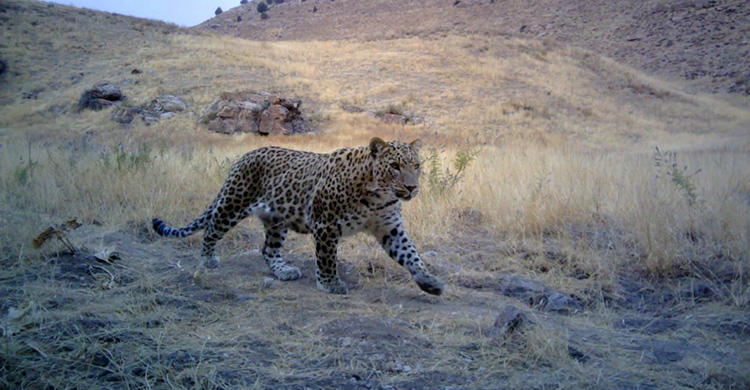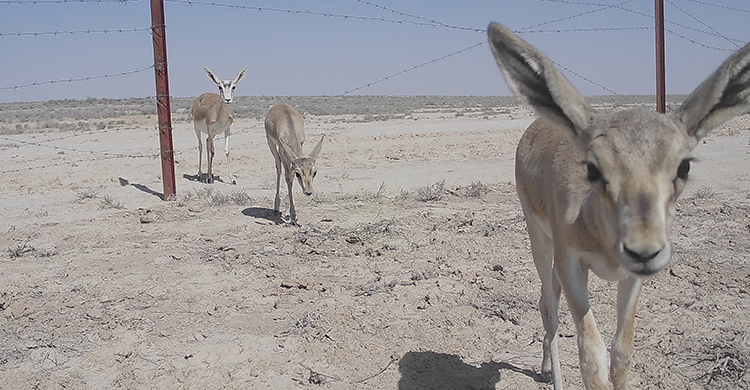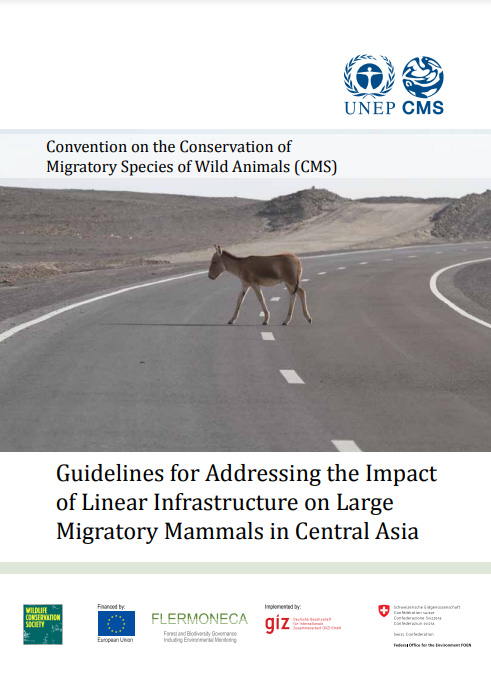Government Representatives and Scientists Agree on a Range-Wide Strategy to Conserve the Persian Leopard

A Persian Leopard in Tandoureh National Park, Iran-Turkmenistan border © Future4Leopards Foundation
Bonn, 24 November 2022 - On 20-22 September 2022, Government representatives and experts from Persian Leopard Range States came together for the first Persian Leopard Range States Meeting held in Tbilisi, Georgia. The Meeting was convened by the CMS Secretariat with logistical support from the Caucasus Nature Fund and with funding from the Federal Ministry for the Environment, Nature Conservation, Nuclear Safety and Consumer Protection of Germany (BMUB) through Germany’s Federal Agency for Nature Protection (BfN). Participants exchanged experiences from their countries, discussed and endorsed the first Range-wide Strategy for the Conservation of the Persian Leopard, which can be found on the first Persian Leopard Range States Meeting Website.
The Persian Leopard (Panthera pardus tulliana) is a sub-species of the Leopard whose range stretches across twelve Range states from the Middle East to the Caucasus, Central and South Asia. The largest population of Persian Leopards is found in Iran. Presence of resident Persian Leopard populations is not confirmed in some of the Range States, such as Turkey, Kazakhstan and Uzbekistan, but recolonization by dispersing animals from neighboring countries is considered likely. Key threats to Persian Leopard survival include: poaching, habitat fragmentation, overgrazing of livestock resulting in prey depletion and lack of cross-border cooperation and coordination. On average, more than 85% of Persian leopard range is located in so-called borderlands in close proximity to national boundaries, making cooperation between Range States a key pre-condition for the survival of this sub-species.
The Range State Meeting was chaired by Ms. Salome Nozadze representing the Georgian Ministry of Environmental Protection and Agriculture. Mr. Karlo Amirgulashvili, head of Biodiversity and Forestry Department welcomed the Participants on behalf of the Ministry and said “I hope that this meeting will serve as a fundamental turning point for strengthening cooperation between Range States of the Persian Leopard”, he added that the Bern Convention will consider the same Draft Strategy at its meeting in November 2022.
The German Ambassador to Georgia, Mr. Peter Fischer said “Germany is delighted to host the Bonn Convention and to support a large conservation Programme in the Caucasus. The world is losing species at a rate that scientists cannot keep up with and different crises exacerbate this situation. The UN is there to bring people together, who would not normally come together to address common environmental issues, therefore, I urge the experts and the Range States of the Persian Leopard to reach an agreement and to bring the results.”
The Range-Wide Strategy for the Conservation of the Persian Leopard, endorsed by the Meeting is a comprehensive document which addresses, inter alia, the need to conduct targeted research on Persian Leopard habitat, range, occurrence and threats to its survival, outlines concrete activities to protect the species, including ex situ and in situ conservation and to strengthen transboundary cooperation. Results, indicators, timeline and estimated budget that are part of the document should facilitate its implementation by national governments. Monitoring of the implementation of the Strategy will be done within the framework of CMS’ Central Asian Mammals Initiative. Furthermore, the Range States agreed to submit the Strategy to the 14th meeting of CMS’ Conference of the Parties, taking place in October 2023 in Uzbekistan to increase the visibility of Persian Leopard conservation and to enable adoption of the Strategy by all CMS Parties.
Last updated on 25 November 2022




